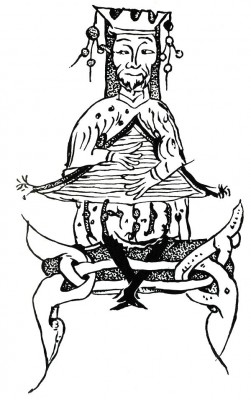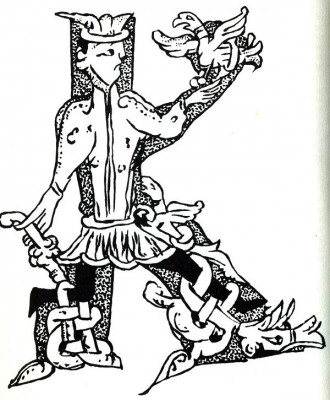Hagiography. The Tale of Dovmont
Hagiography. As with chronicle-writing, in the first half of the fourteenth century we find the same phenomena in hagiography as in the preceding period. Vitae of both princes and churchmen were written. The Lives of princes continued the traditions both of the heroic type (the Pskov Tale of Dovmont) and of princes martyred in the Horde (The Tale of Michael of Tver). One of the earliest works of Moscow literature, The Life of Metropolitan Peter, belongs to the second category.
The Tale of Dovmont. In 1266 Prince Dovmont fled from Lithuania because of the princely strife there and went to Pskov with his retinue “and all his kinsmen”.10 InPskov Dovmont was baptised, christened Timothy and became Prince of Pskov. His reign was marked by successful military operations against
Lithuania and the Teutonic Order, the age-old enemies of Pskov. After his death (1299) Dovmont-Timothy was revered in Pskov as a saint for his military feats.
We have no exact information as to when The Tale of Dovmont was written. Some specialists believe it was in the early 14th century,11 while others date it to the latter half or the end of that century.12
The Tale of Dovmont is found in the Pskov chronicles, but it is hard to say whether it was originally intended for a chronicle or included later. There is every reason to believe, however, that the Tale was written in those literary circles where the Pskov chronicles were compiled. This can be seen from the similarity of style and descriptive devices in the Tale and chronicle accounts of the military feats of the Pskovians.
Individual images and whole sections of the text of The Tale of Dovmont are taken from The Tale of the Life of Alexander Nevsky. For this reason Nikolai Serebryansky concludes that it is merely a “good literary copy of a very good original, but The Tale of Dovmont has hardly any independent literary significance”.13 We cannot agree with this opinion. Making use in an original work of passages from other monuments on a similar subject was a common device in Old Russian literature. By drawing on individual images, situations and fragments of the text of The Tale of the Life of Alexander Nevsky, the author of The Tale of Dovmont merely wished to elevate Dovmont in a special way, to show that both in appearance and in deeds he resembled Alexander Nevsky. At the same time The Tale of Dovmont is original and distinctive in many respects.
The first half of the work, which describes the campaign of Dovmont, already Prince of Pskov, against Lithuania, the battle of Rakovor and the fighting on the River Miropovna, does not depend on literary images. It is full of echoes from heroic accounts by eyewitnesses and participants of these events. In certain passages we can sense its oral epic origin. This is evident in the vocabulary, individual expressions and the rhythm of the narrative. Addressing the men of Pskov before battle, when he is about to enter the fray with them for the first time, Dovmont says: “Brothers, men of Pskov! He who is old is a father to me, and he who is young a brother. I have heard of your courage in all lands. Now, brothers, it is a matter of life or death. Brothers, men of Pskov! Let us stand for the Holy Trinity[1] and the holy churches, for our homeland.”
The Tale is full of military heroism. The military prowess of the Pskovians is stressed with dignified restraint. As well as poetic fervour the work contains the practicality and authentic detail typical of Pskovian literature. The text contains local dialect expressions and use is made of poetic epithets from folk poetry.
The Tale of Dovmont is a fine specimen of Pskovian literature, an original and distinctive work that is at the same time closely connected with the literature of the other Old Russian principalities.
 History of Russian Literature
History of Russian Literature


